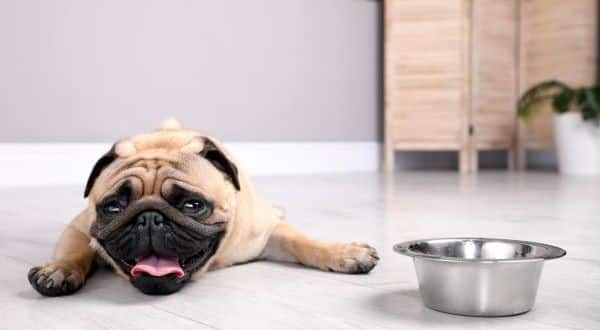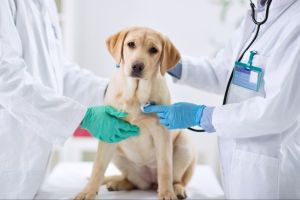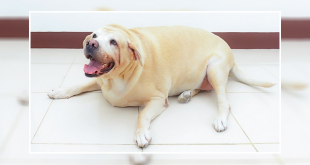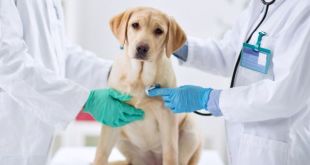Do you have a dog at home? If yes, then you must keep an eye on its hydration level. Dehydration in dogs can lead to different health issues and even risk your pet’s life. You must keep yourself updated about the causes of canine dehydration and how to identify and manage it.
If you’re a new pet owner and don’t have much idea about dog dehydration, you are on the right page. In this guide, we’ll walk through the dehydration process, dehydration symptoms, treatment, and how to prevent dehydration in your dog.
Process of dehydration
Dogs can lose fluids and electrolytes throughout the day with their natural activities. Natural activities include panting, urinating, breathing, defecating, and simple evaporation through their paws. When they eat or drink, they gain the lost electrolytes and feel energetic again.
If the dog doesn’t take enough fluid throughout the day and compensate for their loss, they might suffer from dehydration. It causes a reduction in bodily fluids, which reduces blood flow and following oxygen delivery to their organ or tissues.
Electrolytes are paramount minerals that are crucial for the overall health of the dog as well as humans. Electrolytes are composed of sodium, chloride, and potassium. It regulates the movement of nutrients into cells, helps muscle function, and helps facilitate nerve activities
What are the symptoms of dehydration?
Dogs are always excited for a game of fetch or a walk in the park. But just like us, they can experience dehydration, and it’s essential to understand the signs they might be showing to keep them healthy and happy.
- Skin Pinch Test (Skin Tent): Do you know how puppies have that adorable, plump skin? Well, dehydration can turn it into something entirely different. When you gently pinch the skin on the back of the dog’s neck or between the shoulder blades, it should snap back into place like a rubber band. But if it forms a tent shape and takes a while to return, it signals that your pup may be parched, and their skin tells you, “Hey, I need a drink!”
- Tacky, Dull Gums: Open up your pup’s mouth and take a peek at their gums. Normally, they should be a healthy, rosy pink and slightly moist. If they appear dry, sticky, or dull, it’s like your dog’s saying, “My hydration meter is running low, and I need some water to perk up!”
- Dry Nose: Your dog’s nose is usually a wet, twitchy radar for everything interesting. But when it’s dry and warm instead of calm and damp, it’s as if their built-in moisture gauge sends an S.O.S. signal, indicating they require a hydration rescue mission.
- Thick, Stringy Saliva: Dogs produce saliva to help digestion and keep their mouth comfortable like humans. If their saliva becomes thick and sticky, it’s as if their mouth says, “I’m getting a bit too parched in here. Can we get some liquid refreshment, please?”
- Sunken Eyes: Gaze into your dog’s eyes. Are they looking more like sleepy craters than bright and lively orbs? Dehydration can make their eyes appear sunken and lacking their usual gleam, like an explorer finding a dry oasis.
- Decreased Energy Level (Lethargy): Dogs are bundles of energy, ready to play and explore. But if your pup suddenly seems as lively as a sleeping sloth, dehydration might be to blame.
- Excessive Panting: Dogs pant to control their body temperature, especially when they’re active. However, if your furry friend starts panting excessively without an apparent reason, it’s a sign that they might struggle to cool down, and dehydration could be the culprit.
What are the causes of dehydration in dogs?
There are a variety of reasons for canine dehydration. Some of them include.
- Heatstroke: Dogs love to play outdoors and run around. However, excessive exercise without water, especially in summer, can cause dehydration. While playing, they forget to drink water and become victims of dehydration. They might exhibit symptoms like overheating, drooling, and lethargy, panting.
- Persistent Vomiting and Diarrhea: Digestive issues, such as persistent vomiting and diarrhea, can lead to dehydration in dogs. These conditions result in the loss of essential fluids and electrolytes. If your dog is experiencing these symptoms, it’s crucial to consult a veterinarian to identify and treat the underlying cause.
- Not Getting Enough Water: Sometimes, dehydration occurs simply because a dog isn’t getting enough water. It can happen if its water bowl is empty or it is reluctant to drink due to illness or stress. Ensure your dog always drinks clean and fresh water to prevent dehydration.
- Chronic Illness: Certain chronic illnesses, like kidney disease or diabetes, can make dogs more susceptible to dehydration. These conditions can affect a dog’s ability to retain water properly. Regular veterinary checkups are essential to manage chronic illnesses and monitor hydration levels.
- Parvovirus (Mainly in Puppies): Parvovirus is a highly infectious viral disease mainly affecting puppies. Along with other severe symptoms, it can cause vomiting and diarrhea, leading to rapid dehydration. Vaccination and proper hygiene practices can help prevent this devastating disease.
- Intestinal Parasites (Worms) (Mainly in Puppies): Intestinal parasites like worms can also contribute to dehydration, especially in puppies. These parasites can disrupt the normal absorption of nutrients and water from the digestive tract. Regular deworming and veterinary care are vital for young dogs.
- Foreign Body Obstruction (Eating Rocks, Toys, Etc.) (Mainly in Puppies): Puppies are notorious. They want to explore the world with their mouths, which can sometimes lead to them ingesting foreign objects. If a foreign body obstructs the digestive tract, it can cause vomiting and dehydration. Always supervise your puppy and keep hazardous items out of their reach.
Dehydration treatment for dogs
Seeing your furry friend dehydrated can be concerning, but there are steps you can take to help them bounce back to their playful selves. Here’s a straightforward guide to treating dehydration in dogs:
- Offer Fresh Water: The first and most crucial step is providing your dog access to fresh, clean water. Make sure its water bowl is full and easily accessible. Also, encourage it to take small sips regularly.
- Electrolyte Solutions: Consider giving your dog an electrolyte solution designed for dogs, which you can find at pet stores or your veterinarian’s office. These solutions help replace lost electrolytes and are especially helpful if your dog has been vomiting or having diarrhea.
- Ice Chips or Cubes: Some dogs enjoy ice chips or ice cubes to get some hydration. It’s a fantastic treat that can also help replenish fluids. Just be sure to give them only a little at a time.
- Flavor Their Water: If your dog is reluctant to drink plain water, add a little low-sodium chicken or beef broth to make it more appealing. It can entice your dog to drink more and stay hydrated.
- Monitor Their Intake: Keep a close eye on how much your dog is drinking. If they’re not drinking enough, consider using a syringe or a special pet water bottle to encourage them to drink fluids.
- Wet Food: Feeding your dog wet food with a higher moisture content than dry kibble can help with hydration. It’s a tasty way to get some extra fluids into their system.
- Rest and Calm Environment: Ensure your dog gets plenty of rest in a calm, comfortable environment. Stress and anxiety can exacerbate dehydration, so create a soothing atmosphere for your pup.
- Consult a Vet: If your dog’s dehydration is severe, persists, or has other concerning symptoms like lethargy or loss of hunger, it’s crucial to contact a veterinarian. They can provide the best guidance and may administer fluids intravenously if necessary.
How to treat dehydration in dogs at home?
Dehydration in dogs can be a worrisome issue, but there are steps you can take to address it at home. Keep in mind that severe cases of dehydration require immediate veterinary attention, but for mild to moderate cases, here’s a simple guide to help your furry friend rehydrate:
- Provide Fresh Water: The first and most essential step is always to ensure your dog can access fresh, clean water. Change their water bowl frequently to keep it appealing. Dogs are more likely to drink when the water is cool and clean.
- Encourage Small Sips: If your dog seems reluctant to drink, try encouraging them to take small sips of water. You can gently squirt water into their mouth using a syringe or a small pet water bottle.
- Offer Ice Cubes: Many dogs love chewing on ice cubes, especially on hot days. It can be a fun way for them to hydrate while staying cool. Just be sure to give them only a few at a time.
- Dilute Their Food: If your dog eats dry kibble, consider adding warm water. It makes its food more delicious and increases its moisture intake.
- Use Pedialyte or Electrolyte Solutions: Pedialyte, a human electrolyte solution, can be diluted and offered to dogs in small amounts. Alternatively, you can get electrolyte solutions specifically designed for dogs from pet stores or your veterinarian.
- Offer Wet Food: If your dog usually eats dry food, consider giving it wet food with a higher water content. It’s tasty and an excellent way to provide extra hydration.
- Monitor Their Hydration: Keep a close eye on your dog’s drinking habits and urination. If you notice them drinking more or their urine becoming lighter in color, it’s a positive sign that they are rehydrating.
- Create a Calm Environment: Stress and anxiety can worsen dehydration. Ensure your dog has a calm and comfortable environment to encourage them to relax and recover.
- Rest and Observation: Allow your dog to rest and recover. Sometimes, mild dehydration can be resolved with proper home care. Observe your dog’s behavior and condition closely.
When to Seek Emergency Care for Dehydration in Dogs
Dehydration in dogs can range from mild to extreme, and while you can manage it at home, there are situations where immediate emergency care is crucial to your furry friend’s well-being. Here are some clear signs that you should not ignore and should prompt you to seek emergency veterinary care for your dehydrated dog:
- Extreme Lethargy: If your dog is sluggish and doesn’t respond to your attempts to engage them, it’s a cause for concern. Extreme lethargy can indicate severe dehydration.
- Sunken Eyes: Check your dog’s eyes. If they appear sunken into their sockets, it’s a sign of dehydration. Normal, well-hydrated eyes should be bright and clear.
- Excessive Panting and Rapid Heartbeat: Dehydrated dogs often pant excessively, and their heart rate may become rapid as they try to compensate for the lack of fluids. If you notice these signs, seek help.
- Dry, Sticky Gums: Moist, pink gums are a sign of a healthy dog. If your dog’s gums are dry, sticky, pale, or white, it could indicate severe dehydration. This is an emergency.
- Loss of Appetite: A dog that refuses to eat or has a sudden loss of appetite may be dehydrated. If this persists, it’s essential to get it checked by a veterinarian.
- Vomiting and Diarrhea: Frequent vomiting and diarrhea can lead to rapid dehydration. Seek immediate vet care if your dog has severe diarrhea and cannot keep fluids down.
- Weakness or Collapse: If your dog appears weak, wobbly, or collapses, it’s a severe sign of dehydration and could be life-threatening. Seek emergency care without delay.
- Excessive Drooling: While some drooling is normal for many breeds, excessive drooling can be a sign of dehydration, especially if it’s thick and ropey.
- Urinating Less: A dehydrated dog will urinate less frequently, and their urine may appear dark yellow or amber when they do. Reduced urination is a concerning sign.
- Unresponsiveness: If your dog becomes unresponsive, disoriented, or has seizures, these are critical signs of severe dehydration. Seek emergency care immediately.
Recovery of Dehydration in Dogs: Getting Your Pup Back to Health
When your furry friend has experienced dehydration, helping them recover is a top priority. With the proper care and attention, most dogs can bounce back to their lively selves in no time. Here’s a simple guide to aid in your dog’s recovery from dehydration:
- Hydration is Key: The cornerstone of recovery from dehydration is rehydration. Ensure your dog has continuous access to water. You can encourage it to drink by offering water regularly and in small quantities.
- Reintroduce food: Once your dog begins to rehydrate, gradually reintroduce their regular diet. Start with small, bland meals like boiled chicken and rice. It helps their stomach adjust and minimizes the risk of upsetting their digestion.
- Monitor Their Progress: Keep a close eye on your dog’s behavior and condition as they recover. Look for signs of improvement, such as increased energy, a return of appetite, and regular urination.
- Rest and Comfort: Give your pup plenty of rest and create a comfortable, stress-free environment. Reducing activity and stress can aid in their recovery.
- Consider Electrolytes: In some cases, especially if your dog has experienced severe vomiting or diarrhea, your veterinarian may recommend giving them electrolyte solutions to help restore lost electrolytes.
- Follow Vet Recommendations: If an underlying illness or condition causes your dog’s dehydration, follow your veterinarian’s recommendations for ongoing treatment. It may include medications or special dietary changes.
- Prevent Future Dehydration: Take steps to prevent dehydration in the future. Ensure your dog always has access to water, especially in hot weather or after exercise. Regular veterinary checkups can help catch and address any underlying health issues early.
- Keep an Eye on Hydration: Even after your dog has recovered, please continue to monitor their hydration status. Ensure they are drinking an appropriate amount of water and that their urine is a pale yellow color.
How to Prevent Dehydration in Your Dog
Keeping your canine companion well-hydrated is crucial for their health and happiness. Here are some simple yet effective ways to prevent dehydration in your dog:
- Check your dog’s water bowl regularly and refill it as needed. Clean the bowl daily to keep it appealing.
- Provide more water when your dog is exercising or outside in hot or humid weather.
Just like humans, dogs need more water when active or exposed to heat. Bring water with you on walks, hikes, or outdoor adventures, and offer it to your dog regularly.
- Keep your dog current on vaccinations and parasite prevention. Illnesses like parvovirus and infections from parasites can lead to dehydration. Regular vet visits help protect your dog’s health.
- Be mindful of your dog’s diet. Feed it high-quality dog food that meets its nutritional needs. Avoid feeding them foods that can dehydrate them, such as salty snacks. Consult your vet for dietary guidance.
- Regular vet checkups are paramount for detecting and addressing health issues early. Your veterinarian can also provide advice on maintaining your dog’s overall well-being.
Following these straightforward guidelines, you can help ensure your beloved canine companion stays hydrated and healthy. Remember that prevention is key when it comes to dehydration in dogs, so take proactive steps to keep your furry friend well-hydrated and happy.
Conclusion
Everybody must be aware of the risk of dehydration. You can prevent and manage dehydration in dogs by monitoring their fluid levels, ensuring access to clean water and shade, and getting veterinarian care when necessary.
Just keep in mind that, if left untreated, canine dehydration can be fatal. Therefore, schedule a consultation with your veterinarian if your dog is persistently or seriously dehydrated.
F.A.Q.:
Q: Why Is Dehydration in Dogs a Serious Issue?
A: Dehydration in dogs is a serious issue because it can lead to various health problems, including kidney issues, heatstroke, and organ damage. It impairs their body’s ability to function correctly, and if left untreated, it can become life-threatening.
Q: What to Do If Your Dog Is Dehydrated?
A: If you suspect your dog is dehydrated, it’s essential to encourage them to drink water immediately. Offer small sips at a time. You can also try ice cubes or a dog-safe electrolyte solution. If the dehydration is severe or persists, consult your veterinarian for professional care.
Q: How do you test your dog for dehydration?
A: You can check dehydration by gently pinching the dog’s skin on the back of its neck. If it doesn’t quickly return to its normal position and stays “tented,” it may indicate dehydration. Additionally, check for dry gums, sunken eyes, and increased lethargy as signs of dehydration.
Q: Why would my vet take a blood sample to test for dehydration?
A: Vets may take a blood sample to assess dehydration because it can provide valuable information about your dog’s electrolyte levels and overall health. Elevated levels of specific blood parameters can indicate dehydration and guide appropriate treatment.
Q: How do vets rehydrate dogs?
A: Veterinarians rehydrate dogs through various methods, depending on the severity of dehydration. They may administer fluids orally or subcutaneously (under the skin) for mild cases. In more severe cases, intravenous (IV) fluids may be necessary to restore hydration levels rapidly. Your vet will determine the best approach based on your dog’s condition.
 DogExpress
DogExpress




















 in Chandigarh, India.
in Chandigarh, India. 

